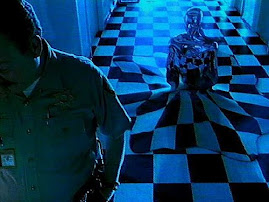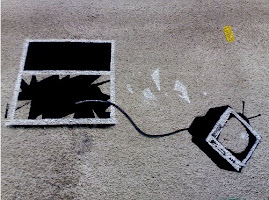Was their any inkling to the average sap in late antiquity that the dark ages were about to descend ? Was the fall of Rome perhaps a hint? Apparently not. Humanity was essentially clueless about the millennium-long unfolding of plague, warfare, torture and cultural decline that was about to commence. And long before that, the ice age, too, seems to have happened unexpectedly -- and rapidly -- catching so many misfortunate mammals; freezing them right in the act of taking a shit or finishing lunch. So that thousands of years latter the likes of us could dig them out of the glaciers and marvel at how they still had a mouthful of fresh half-chewed chow sitting between their jaws; ironically wondering how random chance allowed this to happen so long before the age of the Frigidaire.
Extinction doesn’t just happen to humped back Wales or platypus ducks. Even whole civilizations, on occasion decide to exit the scene without prior notice. The Aztecs did it -- or had it done to them. Maybe the Antlantians did it. That was so long ago that we don’t remember, and can’t quite decide whether Plato, when he wrote about them, was spinning out a work of history or fiction (something like the problem we have today in deciphering Faux News’ accounts of current events). Add to these vanished civilizations the stories of the Mayans, the Moche of Peru, the destruction of Pompeii, and the handful of other documented but now extinct super-cultures that once dominated their little part of paradise on earth, and the old Malthusian warnings about famine, war, pestilence and disease seem a little closer and less surreal than they normally do as we make our way from Wendy’s to Home Depot and Wal-Mart, hunting and gathering along our daily path to survival in the post-modern age.
So, what’s in store for ourselves? Is technology going to save us? Or, maybe, be our ruination? Is there any way, short of simple guessing to see what the future holds for America, or for the western world, Or the third world, or simply for the Earth in it’s entirety? Maybe. But probably not. What ensures the survival of entire cultures and empires -- even our own -- from the cradle of civilization to the unmarked grave of entropy, is perhaps more hit and miss (or in the case of Atlantis “hit and myth”) than any of us might ever imagine.
Both the extinction and the survival of civilizations may be more or less a matter of dumb luck. It is entirely dependent on the coincidental evolutionary ability to deal with unexpected developments in the world around us. It’s that serendipitous process that we have come to attribute to “natural selection“ and the “survival of the fittest”. And, more often than not the over-confident and misguided attempts of our societal planners to anticipate complex social problems leads to results not unlike that of the paradox of the suicidal twin who mistakenly kills his own brother.
Communication, Commerce and A Common Cultural Heritage: How Three Important Civilizing Cornerstones are Crumbling
The obvious problems of great magnitude that confront us as a civilization, are of course, firstly, the ones that have been debated for centuries, and rightfully have continued to be, and, secondly, the ones that have only come into view in the last few decades. Simply stated they are: 1) Overpopulation and the ability of the earth’s resources to sustain that ever increasing base of the universal human tribe. And 2) The perilously wobbling balance of the world’s ecosystem, made increasingly thin by the act of human living itself. But these things, are monumental. They go far beyond the mere survival of civilizations. They determine the survival of the species itself. They threaten not so much to send us back to an agrarian past. They threaten to send us all to an early grave. And from that there is, of course, no comeback. The mere collapse of civilization, by contrast, is something that has happened repeatedly in our past and will likely reoccur perhaps even in predictable cycles. It is a problem that we can deal with -- albeit, after the fact. It’s the predicting part that gets tricky.
I stated a few paragraphs above: “ …Both the extinction and the survival of civilizations may be more or less a matter of dumb luck. It is entirely dependent on the coincidental evolutionary ability to deal with unexpected developments in the world around us. It’s that serendipitous process that we have come to attribute to “natural selection“ and the “survival of the fittest”. “ To that end I would like to look at three endangered aspects of our own American culture that look to be the sorts of Achilles’ heels that, one could speculate, might, in fact, be capable of bringing down a civilization -- even our own. They comprise three essential cornerstones of that civilization -- communications, commerce and the common cultural Heritage -- that are very much immersed in a less than obvious sort of cultural chaos simply by nature of the fact that we swim, fish and play in their waters on a daily basis. So much so that we are lulled into an unsuspecting sleep, and a dream that these things will go on undisturbed eternally. But, most likely, they won’t. Better we remember that melancholy poetic caveat of T.S. Eliot about the end of the misguided life of Prufrock:
Extinction doesn’t just happen to humped back Wales or platypus ducks. Even whole civilizations, on occasion decide to exit the scene without prior notice. The Aztecs did it -- or had it done to them. Maybe the Antlantians did it. That was so long ago that we don’t remember, and can’t quite decide whether Plato, when he wrote about them, was spinning out a work of history or fiction (something like the problem we have today in deciphering Faux News’ accounts of current events). Add to these vanished civilizations the stories of the Mayans, the Moche of Peru, the destruction of Pompeii, and the handful of other documented but now extinct super-cultures that once dominated their little part of paradise on earth, and the old Malthusian warnings about famine, war, pestilence and disease seem a little closer and less surreal than they normally do as we make our way from Wendy’s to Home Depot and Wal-Mart, hunting and gathering along our daily path to survival in the post-modern age.
So, what’s in store for ourselves? Is technology going to save us? Or, maybe, be our ruination? Is there any way, short of simple guessing to see what the future holds for America, or for the western world, Or the third world, or simply for the Earth in it’s entirety? Maybe. But probably not. What ensures the survival of entire cultures and empires -- even our own -- from the cradle of civilization to the unmarked grave of entropy, is perhaps more hit and miss (or in the case of Atlantis “hit and myth”) than any of us might ever imagine.
Both the extinction and the survival of civilizations may be more or less a matter of dumb luck. It is entirely dependent on the coincidental evolutionary ability to deal with unexpected developments in the world around us. It’s that serendipitous process that we have come to attribute to “natural selection“ and the “survival of the fittest”. And, more often than not the over-confident and misguided attempts of our societal planners to anticipate complex social problems leads to results not unlike that of the paradox of the suicidal twin who mistakenly kills his own brother.
Communication, Commerce and A Common Cultural Heritage: How Three Important Civilizing Cornerstones are Crumbling
The obvious problems of great magnitude that confront us as a civilization, are of course, firstly, the ones that have been debated for centuries, and rightfully have continued to be, and, secondly, the ones that have only come into view in the last few decades. Simply stated they are: 1) Overpopulation and the ability of the earth’s resources to sustain that ever increasing base of the universal human tribe. And 2) The perilously wobbling balance of the world’s ecosystem, made increasingly thin by the act of human living itself. But these things, are monumental. They go far beyond the mere survival of civilizations. They determine the survival of the species itself. They threaten not so much to send us back to an agrarian past. They threaten to send us all to an early grave. And from that there is, of course, no comeback. The mere collapse of civilization, by contrast, is something that has happened repeatedly in our past and will likely reoccur perhaps even in predictable cycles. It is a problem that we can deal with -- albeit, after the fact. It’s the predicting part that gets tricky.
I stated a few paragraphs above: “ …Both the extinction and the survival of civilizations may be more or less a matter of dumb luck. It is entirely dependent on the coincidental evolutionary ability to deal with unexpected developments in the world around us. It’s that serendipitous process that we have come to attribute to “natural selection“ and the “survival of the fittest”. “ To that end I would like to look at three endangered aspects of our own American culture that look to be the sorts of Achilles’ heels that, one could speculate, might, in fact, be capable of bringing down a civilization -- even our own. They comprise three essential cornerstones of that civilization -- communications, commerce and the common cultural Heritage -- that are very much immersed in a less than obvious sort of cultural chaos simply by nature of the fact that we swim, fish and play in their waters on a daily basis. So much so that we are lulled into an unsuspecting sleep, and a dream that these things will go on undisturbed eternally. But, most likely, they won’t. Better we remember that melancholy poetic caveat of T.S. Eliot about the end of the misguided life of Prufrock:
"We have lingered in the chambers of the sea
By sea-girls wreathed with seaweed red and brown
Till human voices wake us, and we drown. "
The Digital Age: How it Wastes Our Time, Tries our Tempers and Fails our Expectations
By sea-girls wreathed with seaweed red and brown
Till human voices wake us, and we drown. "
The Digital Age: How it Wastes Our Time, Tries our Tempers and Fails our Expectations
We are convinced today that we live in a world made better by a conversion from analog to digital technology. And while all of us are understandably awed by that ubiquitous flooding of information into our daily lives, we are not necessarily all the better for that. Have we taken what was simple and digestible to the homo sapien mind and made it complex to the point of being beyond the limits of usability? Is it possible that “user-friendliness” has inherent limits beyond which we cannot go in a capitalist society; one determined to cut costs to the bone by eliminating every aspect of human utility?
How the New Hardware of Communications Determines its Content
Fifty years ago, Marshall McLuhan told us simply, that “the medium is the message”. It made a nice looking paperback on the racks of Burns’ drugstore in my hometown. And so, of course, while other kids were preoccupied with playing baseball, I snatched it up. It was prophetic. Today that is so easy to see. Take for instance, how the “new and improved” economic order of our own times compares to that of the less technologically sophisticated world of only 50 years ago. In the America I grew up in in the 1960’s there were a multitude of simple devices that, while still around “in spirit“, have been technologically enhanced, or “super under-sized” if you will. For instance, there was the telephone. For about 90 years, since 1876 when it was invented, it had changed little. It was a simple and reliable device that depended on human support (telephone operators) and a nationwide network of copper wiring that also transmitted to homes the electricity coming from our system of electrical grids. Public companies provided not only the basic equipment to consumers, but also were able to service the devices, usually on the same day that a complaint was received. They also provided a network of public phone booths so that consumers away from their “plugged in the wall” phones could make calls conveniently from distant points. And it was all done in an affordable manner. Then in 1973, the first cordless cell phone was introduced and there was a revolution underway in communications.
But, is communication actually better today? I would argue , no. Because, you see, while phones have become portable, lighter in weight, and reliant on digital instead of human driven technology, they have at the same time -- unexpectedly -- become much less reliable. For those who actually use cell phones, the annoyances of “dropped calls”, excessive monthly costs and usage fees, hours wasted in poor service reporting (“Your call will be answered in the order it was received. Please stay on the line. Your call is important to us…”) is obvious. In fact, it is just as obvious to non-users who watch the endless unapologetic hours of television commercials based on the “Can you hear me now?” problem that is ubiquitous in the cell phone industry. And we may as well mention now the health threats related to cell phone usage that were never a concern prior to the digital age. In addition, the telecom industry has managed to transfer the cost of distant calling from their own corporate ledgers onto the shoulders of consumers, as public telephone booths have all but disappeared in the last few decades.
You Are What You Read, and Watch on the Tube
Fifty years ago, Marshall McLuhan told us simply, that “the medium is the message”. It made a nice looking paperback on the racks of Burns’ drugstore in my hometown. And so, of course, while other kids were preoccupied with playing baseball, I snatched it up. It was prophetic. Today that is so easy to see. Take for instance, how the “new and improved” economic order of our own times compares to that of the less technologically sophisticated world of only 50 years ago. In the America I grew up in in the 1960’s there were a multitude of simple devices that, while still around “in spirit“, have been technologically enhanced, or “super under-sized” if you will. For instance, there was the telephone. For about 90 years, since 1876 when it was invented, it had changed little. It was a simple and reliable device that depended on human support (telephone operators) and a nationwide network of copper wiring that also transmitted to homes the electricity coming from our system of electrical grids. Public companies provided not only the basic equipment to consumers, but also were able to service the devices, usually on the same day that a complaint was received. They also provided a network of public phone booths so that consumers away from their “plugged in the wall” phones could make calls conveniently from distant points. And it was all done in an affordable manner. Then in 1973, the first cordless cell phone was introduced and there was a revolution underway in communications.
But, is communication actually better today? I would argue , no. Because, you see, while phones have become portable, lighter in weight, and reliant on digital instead of human driven technology, they have at the same time -- unexpectedly -- become much less reliable. For those who actually use cell phones, the annoyances of “dropped calls”, excessive monthly costs and usage fees, hours wasted in poor service reporting (“Your call will be answered in the order it was received. Please stay on the line. Your call is important to us…”) is obvious. In fact, it is just as obvious to non-users who watch the endless unapologetic hours of television commercials based on the “Can you hear me now?” problem that is ubiquitous in the cell phone industry. And we may as well mention now the health threats related to cell phone usage that were never a concern prior to the digital age. In addition, the telecom industry has managed to transfer the cost of distant calling from their own corporate ledgers onto the shoulders of consumers, as public telephone booths have all but disappeared in the last few decades.
You Are What You Read, and Watch on the Tube
And now, the same can even be said of the, increasingly unreliable, electric grid that transfers power to the millions of American homes around the nation. They, along with the whole infrastructure network of the country, including roads, bridges, interstate highways and power generating systems have been neglected to the point where they are not only frequently nonfunctional, but represent a public safety hazard. Yet political leaders continue to pacify the tax paying public that what is needed to solve these problems are not tax increases, but even more tax relief -- especially for that segment of the population most able to pay such increases. And that, of course, is because that same segment of rich and affluent Americans (and even some foreign nationals) have been busy for the past 40 years motoring up the media. They have used it to promote, with the relentless urgency of a war-time propaganda machine, the message of the Chicago School of Economics, that greed is good, that a nation can prosper on endless consumption without the need to ever produce anything useful, and that the natural price of prosperity is the presence of a permanent poor working underclass. And it has worked. It has worked because the new technology aligns itself so well with an old strategy, put simply: “If you can’t dazzle them with brilliance, then baffle them with bullshit.“ They did. And the American people bought into it. Into the whole theology of downward mobility -- from the necessity of two-income families to the inevitability of balloon mortgages that preclude the possibility of significant home equity without the assist of the
invisible hand of inflation. Into the myth that “entitlement” is the natural custody of multinational corporations and not the claim ordinary workers make on that part of the gross national product that was generated from the sweat of their own brows. They did so as the news media increasingly morphed from being news into a kind of perpetual “infomercial” of the sort that saturates the Faux network today. McLuhan had warned us that all advertising is news. But, also, that all advertising is always only “good news”. And as all news became all advertising, all news became good news -- even bad news. The deaths of soldiers and civilians in Iraq and Afghanistan became the good news of the transplanting of democracy into the Middle East, instead of the bad news of the mutilation of human beings for the gluttonous acquisition of oil. And similarly, the bad news of massive downward social mobility and the disappearance of the American middle class became the good news of permanent lower taxation and the triumph of all American capitalism over godless socialism. And it made the new politics of consumption (even when it was the eating of one’s own body parts) not only palatable, but absolutely mouth watering.
As the American tax system has become increasingly less progressive over the past 40 years - since the Reagan administration -- we have witnessed both a massive transfer of wealth from the working middle class into the hands of our wealthiest citizens and a simultaneous deterioration of those public services and infrastructures designed to service that very same middle class. But it is illusion to believe that the progressive income tax (the marginal rate of which was 90% for the richest taxpayers during the moderate, Republican, Eisenhower presidency) can be expected to deliver comparable reliable public services at the current 35% top marginal rate on capital gains (which are the largest source of income for the rich) instituted under the Bush tax cuts. And the rich, of course do not have to deal with the problem of cheapened public technology since they can afford to pay the cost of enhanced private communication networks which are beyond the economic reach of the middle class.
How did this happen? How did a progressive, strong, organized, unionized middle class -- one that had persisted and flourished for 40 years from Roosevelt to Reagan suddenly come undone? It did so with the assistive hand of the new technology. A hand which reached not only into the pockets of ordinary Americans, but into their brains; erasing old content and replacing it with new. Replacing the notion of common social responsibility for the many -- that venerable idea known as the “social contract” with the neo-conservative notion of an “ownership society”. But it neglected to tell ordinary Americans, the inheritors of a disappearing middle class, that they themselves were to become the owned.
Next, Part 2: “How Our Banking System Fails Us Now”
-
-
invisible hand of inflation. Into the myth that “entitlement” is the natural custody of multinational corporations and not the claim ordinary workers make on that part of the gross national product that was generated from the sweat of their own brows. They did so as the news media increasingly morphed from being news into a kind of perpetual “infomercial” of the sort that saturates the Faux network today. McLuhan had warned us that all advertising is news. But, also, that all advertising is always only “good news”. And as all news became all advertising, all news became good news -- even bad news. The deaths of soldiers and civilians in Iraq and Afghanistan became the good news of the transplanting of democracy into the Middle East, instead of the bad news of the mutilation of human beings for the gluttonous acquisition of oil. And similarly, the bad news of massive downward social mobility and the disappearance of the American middle class became the good news of permanent lower taxation and the triumph of all American capitalism over godless socialism. And it made the new politics of consumption (even when it was the eating of one’s own body parts) not only palatable, but absolutely mouth watering.
As the American tax system has become increasingly less progressive over the past 40 years - since the Reagan administration -- we have witnessed both a massive transfer of wealth from the working middle class into the hands of our wealthiest citizens and a simultaneous deterioration of those public services and infrastructures designed to service that very same middle class. But it is illusion to believe that the progressive income tax (the marginal rate of which was 90% for the richest taxpayers during the moderate, Republican, Eisenhower presidency) can be expected to deliver comparable reliable public services at the current 35% top marginal rate on capital gains (which are the largest source of income for the rich) instituted under the Bush tax cuts. And the rich, of course do not have to deal with the problem of cheapened public technology since they can afford to pay the cost of enhanced private communication networks which are beyond the economic reach of the middle class.
How did this happen? How did a progressive, strong, organized, unionized middle class -- one that had persisted and flourished for 40 years from Roosevelt to Reagan suddenly come undone? It did so with the assistive hand of the new technology. A hand which reached not only into the pockets of ordinary Americans, but into their brains; erasing old content and replacing it with new. Replacing the notion of common social responsibility for the many -- that venerable idea known as the “social contract” with the neo-conservative notion of an “ownership society”. But it neglected to tell ordinary Americans, the inheritors of a disappearing middle class, that they themselves were to become the owned.
Next, Part 2: “How Our Banking System Fails Us Now”
-
-

Is the End in Sight? -- Why the Extinction of Entire Civilizations Happens by jimmi malarky is licensed under a Creative Commons Attribution-Noncommercial-No Derivative Works 3.0 United States License.
Based on a work at malarkyspond.blogspot.com.
Permissions beyond the scope of this license may be available at http://malarkyspond.blogspot.com/.



















No comments:
Post a Comment